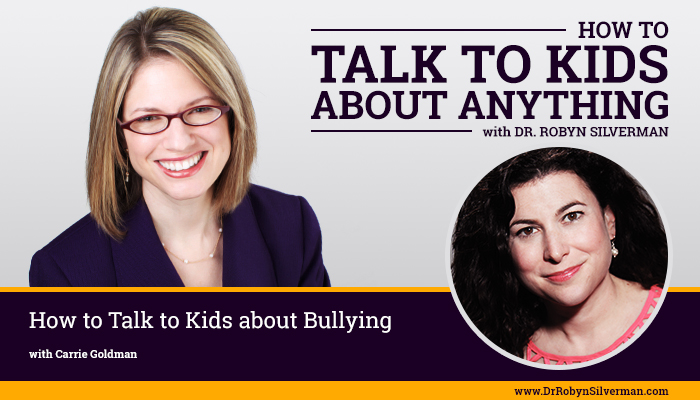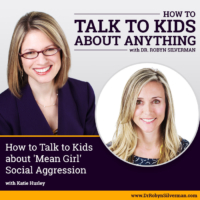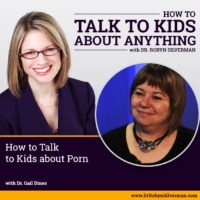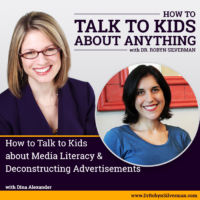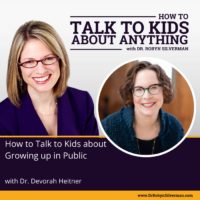Podcast: Play in new window | Download
Subscribe: Apple Podcasts | RSS | More
How to Talk to Kids about Bullying
This podcast will focus on what bullying is vs normal social conflict as well as what to do and say when your child tells you that s/he is being bullied. What is a true friend? How can we help? What message can we send to bystanders and how can the consequence to bullying be restorative rather than just punitive? We also go over what to when a child feels scared to ask for help for fear of retaliation. And what do we say to the child who is socially different and is getting the message that they deserve to be mistreated due to their undesirable traits or behaviors? This podcast provides the answers.
Special Guest: Carrie Goldman
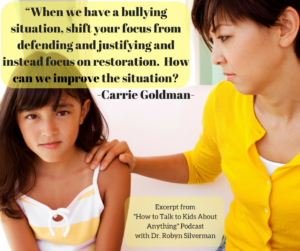 Bullying is a hot topic these days- of course it is. Studies tell us that, more and more, bullying can have a lasting effect on a person’s mental health. Not to mention, we hear tragic stories about children feeling hopeless and helpless when they are being bullied- even some who have turned to hurting themselves or suicide because they don’t see anyway out. As a person who was bullied during my 5th grade year—I can relate to feeling so frustrated and upset and misunderstood and stuck, overwhelmed and targeted while I was being bullied- and I vowed that I would do whatever it took to help young people feel confident in their own skin, speak up when they see something is not right, and help the adults who love kids to know some tips and scripts to be helpful when a child is being bullied. You have heard the podcast with Rosalind Wiseman when we spoke abut creating a culture of dignity among young people- now we have one of my friends and colleagues, Carrie Goldman, on the show, to talk more about bullying, in particular.
Bullying is a hot topic these days- of course it is. Studies tell us that, more and more, bullying can have a lasting effect on a person’s mental health. Not to mention, we hear tragic stories about children feeling hopeless and helpless when they are being bullied- even some who have turned to hurting themselves or suicide because they don’t see anyway out. As a person who was bullied during my 5th grade year—I can relate to feeling so frustrated and upset and misunderstood and stuck, overwhelmed and targeted while I was being bullied- and I vowed that I would do whatever it took to help young people feel confident in their own skin, speak up when they see something is not right, and help the adults who love kids to know some tips and scripts to be helpful when a child is being bullied. You have heard the podcast with Rosalind Wiseman when we spoke abut creating a culture of dignity among young people- now we have one of my friends and colleagues, Carrie Goldman, on the show, to talk more about bullying, in particular.
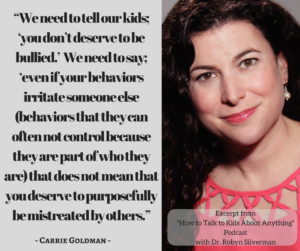 Carrie Goldman is the award-winning author of Bullied: What Every Parent, Teacher, and Kid Needs to Know About Ending the Cycle of Fear (Harper Collins). Bullied has received a National Parenting Publication Award and a Mom’s Choice Award, both at the gold medal level, for excellence in educational skills and tools. Carrie has also written for The New York Times, CNN, Psychology Today, Huffington Post, Brain Child Magazine, Adoption.net, Babble, Alternet, and more. She has made appearances on NPR, BBC, MSNBC, CNN Headline News, Fox, HLN, HuffPost Live and Mondays with Marlo, along with countless other media outlets. In addition to her expertise in bullying dynamics, Carrie writes one of the nation’s premier adoption blogs, Portrait of an Adoption, which has followers in more than 45 countries. Her acclaimed children’s chapter book, Jazzy’s Quest: Adopted and Amazing, came out in June of 2015, and the sequel, Jazzy’s Quest: What Matters Most, came out in November of 2016. You can find more out about our fabulous guest, Carrie Goldman, at CarrieGoldmanAuthor.com
Carrie Goldman is the award-winning author of Bullied: What Every Parent, Teacher, and Kid Needs to Know About Ending the Cycle of Fear (Harper Collins). Bullied has received a National Parenting Publication Award and a Mom’s Choice Award, both at the gold medal level, for excellence in educational skills and tools. Carrie has also written for The New York Times, CNN, Psychology Today, Huffington Post, Brain Child Magazine, Adoption.net, Babble, Alternet, and more. She has made appearances on NPR, BBC, MSNBC, CNN Headline News, Fox, HLN, HuffPost Live and Mondays with Marlo, along with countless other media outlets. In addition to her expertise in bullying dynamics, Carrie writes one of the nation’s premier adoption blogs, Portrait of an Adoption, which has followers in more than 45 countries. Her acclaimed children’s chapter book, Jazzy’s Quest: Adopted and Amazing, came out in June of 2015, and the sequel, Jazzy’s Quest: What Matters Most, came out in November of 2016. You can find more out about our fabulous guest, Carrie Goldman, at CarrieGoldmanAuthor.com
The podcast provides:
- Tips: What to do when your child feels that they are being bullied.
- The difference between bullying and normal social conflict.
- Scripts: What to ask to determine if your child is being bullied or in typical friendship issues.
- Steps: What to do and say when your child reveals they are being bullied.
- Assessment: Is this a true friend or a bad friend?
- What to do when a child says s/he doesn’t want your help with the bullying situation.
- Assessment: Why do your child NOT want help?
Important Messages:
- Bullying is repetitive, unwanted, and is there a power imbalance.
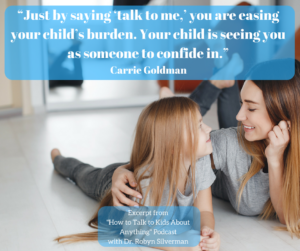
- Ask your child; are you afraid that if you confront this person, they can make it so other people don’t hang out with you? This is key. If the answer is yes- there may be a power imbalance.
- We need to tell our kids- you don’t deserve to be bullied. Even if they are different or people find some of their behaviors irritating, they don’t deserve to be bullied. A child who has behaviors that they are NOT choosing- they are simply part of who they are- shouldn’t be bullied by others who are CHOOSING to be unkind.
- While you are working on helping kids in need of social skills work to change their behaviors, you are also helping those who are coping with that child’s behaviors who need to know how to handle it.
- How to assess whether we have a true friend or bad friend.
- Thank your children for coming to you when they are being bullied. Even if you think that your child is not letting you help in the way you want to help, by being a person that they can talk to, you are helping!
- Know what specific behaviors are leading to your child to feel that s/he is being bullied.
- Provide empathy to other parents when they come to you and tell you that your child is involved in bullying behavior.
- When we have a bullying situation, just having a punitive response is going to make an angry or hostile child more angry and hostile. It will not make that child feel any differently towards the target. Instead, ask kids to do a restorative response (even if you pair it with consequences). Find ways for your child to restore the relationships rather than just focusing on punishing your child. How can we make this better not how can we cover this up?
- We want the kids to know that if they see bullying in action, the only unacceptable response is to do nothing to help.
- Give support to the victim rather than attacking the attacker.
Notable Quotables:
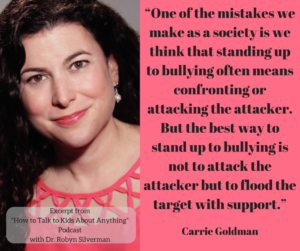 “There is such a culture of silence around getting help and such a fear of retaliation that it’s important to start with ‘thank you for telling me you are having this experience. Thank you for sharing this experience with me so you are not so alone.’”
“There is such a culture of silence around getting help and such a fear of retaliation that it’s important to start with ‘thank you for telling me you are having this experience. Thank you for sharing this experience with me so you are not so alone.’”- “We need to tell our kids; ‘you don’t deserve to be bullied.’ This is particularly important if you have a child who has behaviors that are aggressive or socially different. They get the message from people that they are being mistreated because they are different or annoying. We need to say to that child; ‘even if your behaviors irritate someone else (behaviors that they can often not control because they are part of who you are) that does not mean that you deserve to purposefully be mistreated by others.”
- “Relationships are always at the level of the least involved person. We have to ask our children; When you’re with this person, do you feel welcome? Does that person talk to you always- because they are happy to see you or just until someone better comes along? When this person is not near you, do they say good things about you or unkind things about you? Does this person allow you to choose your own friends? You can not make someone want to be with you more than they do.”
- “Just by saying ‘talk to me,’ you are easing your child’s burden. Your child is seeing you as someone to confide in.”
- When considering whether to make a report to the school, ask your child; (1) what are the specific behaviors that are happening? (2) How is this affecting you? And (3) What would you like to see happen in your ideal world?
- “When we have a bullying situation, shift your focus, as a parent, from defending and justifying and instead focus on restoration. How can we improve this situation?”
- “We want to send the message to our kids; ‘if you’re your hurting, you’ll never make your situation worse by getting help sooner.’”
- “There is never a case to be made to be just a bystander. You can always be a witness or an ally.”
- “One of the mistakes we make as a society is we think that standing up to bullying often means confronting or attacking the attacker. But the best way to stand up to bullying is not to attack the attacker but to flood the target with support.”
Resources:
- FREE BULLYING HANDOUTS and PHONE CONTRACT! Click to Download .zip file
- www.CarrieGoldmanAuthor.com
- Book: Bullied: What Every Parent, Teacher, and Kid Needs to Know About Ending the Cycle of Fear
- Bully
- Jazzy’s Quest: Adopted and Amazing
- Jazzy’s Quest: What Matters Most
- Carrie shared her email: [email protected]
- Trudy Ludwig: Good friends, bad friends chart

